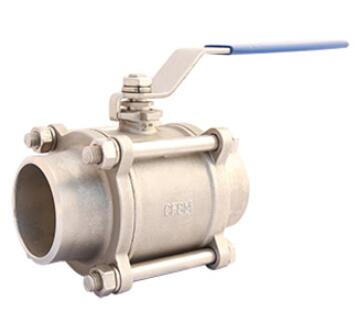Ball valves are an essential component in modern piping systems, widely used for controlling the flow of liquids and gases. With their simple yet effective design, ball valves provide reliable, bubble-tight sealing and are known for their long lifespan and ease of use. This article explores the various applications of ball valves, their key benefits, and how they play a crucial role in different industries.

On/Off Control
One of the primary uses of ball valves is for on/off control in a piping system. The valve operates by turning a hollow, perforated, and pivoting ball inside the valve body. When the valve handle is rotated, the ball aligns with the pipeline, allowing fluid to flow through or blocks the flow completely, depending on the position of the ball. This on/off functionality makes ball valves ideal for isolating parts of the system during maintenance or when you need to stop the flow of liquid or gas in a pipeline quickly. Ball valves are especially suitable for applications where a tight shut-off is required, such as in water, oil, or gas systems.
Bubble-Tight Service
Ball valves are particularly well-regarded for their ability to provide bubble-tight sealing. When closed, the ball valve’s sealing mechanism is designed to prevent any leakage of the fluid or gas, even under high-pressure conditions. This makes them perfect for critical applications where leakage is unacceptable, such as in the chemical, pharmaceutical, and food processing industries. The smooth, hard surface of the ball combined with soft sealing seats ensures that the valve can withstand even harsh operating conditions and provide a reliable, tight seal that prevents leaks and minimizes downtime.
Isolation Purposes
Another common use of ball valves is for isolation. In many systems, isolation is necessary to shut off a portion of the pipeline for maintenance, inspection, or repair. Ball valves are perfect for this purpose because they provide quick, effective isolation with minimal effort. They are often used to isolate different sections of a system without causing disruption to the rest of the operation. For instance, ball valves are frequently employed in gas pipelines, water treatment plants, and oil rigs to isolate certain sections of the system when needed.
Pressure Control
While ball valves are primarily used for on/off and isolation functions, they can also be used to regulate or control pressure in a pipeline by partially opening the valve. By adjusting the ball’s position, operators can control the flow rate and pressure within a system. This partial opening helps maintain a desired pressure level, making ball valves useful in situations where precise control over the fluid or gas flow is required. For example, in heating systems, cooling systems, or industrial processes, ball valves can be used to manage and adjust pressure, ensuring safe and efficient operations.
Flow Regulation
In addition to controlling pressure, ball valves are also employed in systems where regulating the flow rate is essential. By adjusting the ball valve to a partially open position, operators can control the amount of fluid or gas flowing through the pipeline. Although ball valves are more commonly associated with on/off functions, they can be adjusted for more gradual flow control, especially when fine-tuned adjustments are necessary. These types of valves are often used in irrigation systems, fuel distribution systems, and various manufacturing processes where controlled flow is critical.
Wide Range of Applications
Ball valves are incredibly versatile and can be used across various industries and applications. In the oil and gas industry, they are used to control the flow of crude oil, natural gas, and other chemicals. In water treatment plants, they help manage water flow and isolate different sections of the pipeline. Ball valves are also widely used in heating and cooling systems, food and beverage manufacturing, pharmaceuticals, and even residential plumbing systems. Their reliability, durability, and ease of operation make them a preferred choice for many applications where precision, safety, and efficiency are important.
Benefits of Ball Valves
Ball valves offer a range of benefits that make them ideal for many applications. They are known for their quick response time, ease of operation, and minimal maintenance requirements. The design of ball valves allows for high flow capacity, making them suitable for both large and small pipelines. Additionally, the materials used to make ball valves (such as stainless steel, brass, and plastic) provide excellent resistance to corrosion and wear, ensuring long-lasting performance in a variety of environments.
Conclusion
Ball valves are indispensable components used for on/off control, isolation, pressure regulation, and flow control in a wide range of industries. Their bubble-tight sealing, durability, and ease of use make them ideal for applications that require reliable and efficient valve operation. Whether you need to shut off a section of a pipeline, control pressure, or regulate flow, ball valves provide a simple and effective solution. If you are looking for high-quality ball valves for your systems, don’t hesitate to contact us. As a trusted supplier, we offer a wide range of ball valves designed to meet the specific needs of your application.

